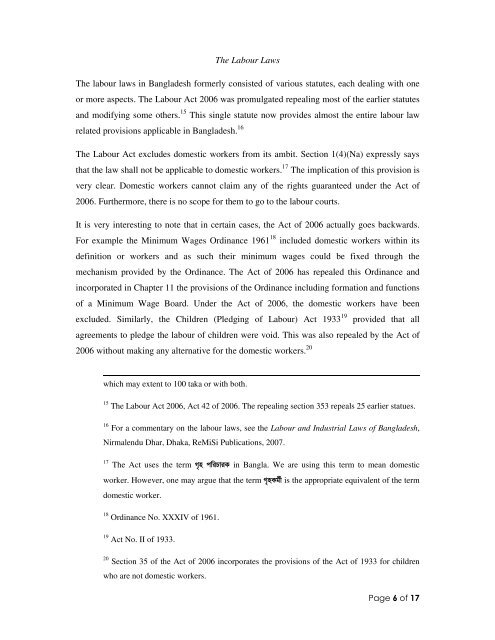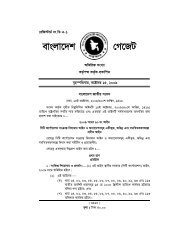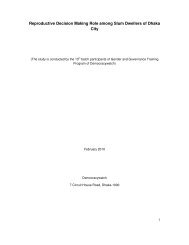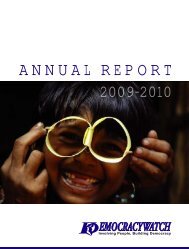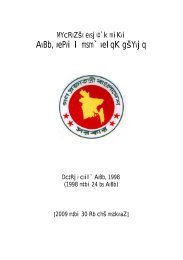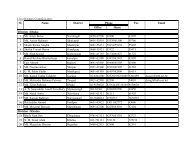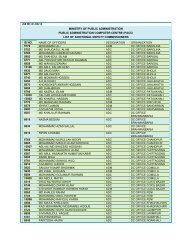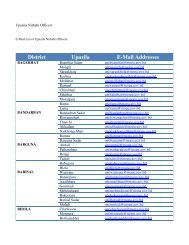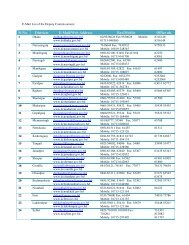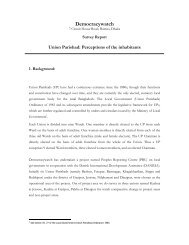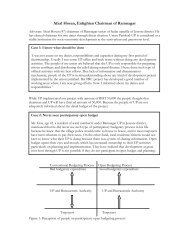Safeguarding the rights of domestic workers: Existing laws and ways ...
Safeguarding the rights of domestic workers: Existing laws and ways ...
Safeguarding the rights of domestic workers: Existing laws and ways ...
You also want an ePaper? Increase the reach of your titles
YUMPU automatically turns print PDFs into web optimized ePapers that Google loves.
The Labour Laws<br />
The labour <strong>laws</strong> in Bangladesh formerly consisted <strong>of</strong> various statutes, each dealing with one<br />
or more aspects. The Labour Act 2006 was promulgated repealing most <strong>of</strong> <strong>the</strong> earlier statutes<br />
<strong>and</strong> modifying some o<strong>the</strong>rs. 15 This single statute now provides almost <strong>the</strong> entire labour law<br />
related provisions applicable in Bangladesh. 16<br />
The Labour Act excludes <strong>domestic</strong> <strong>workers</strong> from its ambit. Section 1(4)(Na) expressly says<br />
that <strong>the</strong> law shall not be applicable to <strong>domestic</strong> <strong>workers</strong>. 17 The implication <strong>of</strong> this provision is<br />
very clear. Domestic <strong>workers</strong> cannot claim any <strong>of</strong> <strong>the</strong> <strong>rights</strong> guaranteed under <strong>the</strong> Act <strong>of</strong><br />
2006. Fur<strong>the</strong>rmore, <strong>the</strong>re is no scope for <strong>the</strong>m to go to <strong>the</strong> labour courts.<br />
It is very interesting to note that in certain cases, <strong>the</strong> Act <strong>of</strong> 2006 actually goes backwards.<br />
For example <strong>the</strong> Minimum Wages Ordinance 1961 18 included <strong>domestic</strong> <strong>workers</strong> within its<br />
definition or <strong>workers</strong> <strong>and</strong> as such <strong>the</strong>ir minimum wages could be fixed through <strong>the</strong><br />
mechanism provided by <strong>the</strong> Ordinance. The Act <strong>of</strong> 2006 has repealed this Ordinance <strong>and</strong><br />
incorporated in Chapter 11 <strong>the</strong> provisions <strong>of</strong> <strong>the</strong> Ordinance including formation <strong>and</strong> functions<br />
<strong>of</strong> a Minimum Wage Board. Under <strong>the</strong> Act <strong>of</strong> 2006, <strong>the</strong> <strong>domestic</strong> <strong>workers</strong> have been<br />
excluded. Similarly, <strong>the</strong> Children (Pledging <strong>of</strong> Labour) Act 1933 19<br />
provided that all<br />
agreements to pledge <strong>the</strong> labour <strong>of</strong> children were void. This was also repealed by <strong>the</strong> Act <strong>of</strong><br />
2006 without making any alternative for <strong>the</strong> <strong>domestic</strong> <strong>workers</strong>. 20<br />
<br />
which may extent to 100 taka or with both.<br />
15 The Labour Act 2006, Act 42 <strong>of</strong> 2006. The repealing section 353 repeals 25 earlier statues.<br />
16 For a commentary on <strong>the</strong> labour <strong>laws</strong>, see <strong>the</strong> Labour <strong>and</strong> Industrial Laws <strong>of</strong> Bangladesh,<br />
Nirmalendu Dhar, Dhaka, ReMiSi Publications, 2007.<br />
17 The Act uses <strong>the</strong> term in Bangla. We are using this term to mean <strong>domestic</strong><br />
worker. However, one may argue that <strong>the</strong> term is <strong>the</strong> appropriate equivalent <strong>of</strong> <strong>the</strong> term<br />
<strong>domestic</strong> worker.<br />
18 Ordinance No. XXXIV <strong>of</strong> 1961.<br />
19 Act No. II <strong>of</strong> 1933.<br />
20 Section 35 <strong>of</strong> <strong>the</strong> Act <strong>of</strong> 2006 incorporates <strong>the</strong> provisions <strong>of</strong> <strong>the</strong> Act <strong>of</strong> 1933 for children<br />
who are not <strong>domestic</strong> <strong>workers</strong>.


